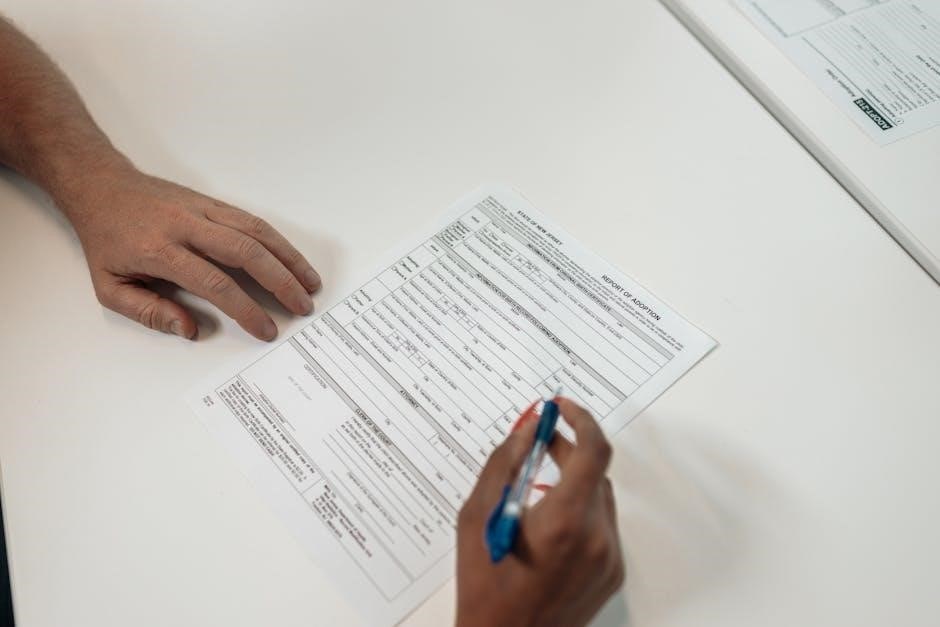
An Application to Vary or Revoke an Apprehended Violence Order (AVO) allows individuals to seek changes or cancellation of an existing AVO. This process involves filing a specific form with the court and may require legal representation. The application can be made to modify conditions, reduce duration, or cancel the order entirely. It is essential to understand the legal implications and follow proper procedures to ensure the application is handled correctly.
1.1 What is an Apprehended Violence Order (AVO)?
An Apprehended Violence Order (AVO) is a court order designed to protect a person from violence, threats, or harassment. It can be issued to prohibit specific behaviors and restrict contact between parties. AVOs are typically categorized as interim or final orders, with durations varying based on circumstances. The protected person must have reasonable grounds to fear violence or intimidation. AVOs are legal tools to ensure safety and prevent potential harm, balancing the rights of all parties involved while maintaining public safety and order. Understanding its purpose and scope is crucial for navigating related legal processes.
1.2 Why Would Someone Want to Vary or Revoke an AVO?
Individuals may seek to vary or revoke an AVO due to changed circumstances, such as reconciliation with the protected person or the resolution of initial conflicts. Others may argue the order was issued without sufficient evidence or that its conditions are overly restrictive. In some cases, the AVO may no longer be necessary, or its terms may infringe on daily life, such as limiting contact with children or affecting employment. Legal advice is recommended to navigate this complex process and ensure the application is based on valid grounds, as courts carefully evaluate such requests to balance protection and individual rights.

The Process of Applying to Vary or Revoke an AVO
The process involves completing the Application to Vary or Revoke an AVO Form, filing it with the court, and attending a hearing. Legal representation is recommended.
2.1 Eligibility to Apply for Variation or Revocation
Eligibility to apply for variation or revocation of an AVO depends on the circumstances. The defendant or the protected person, with court permission, can file the application. Legal advice is crucial to navigate the process effectively and ensure all requirements are met.
2.2 The Role of the Protected Person in the Process
The protected person plays a significant role in the process of varying or revoking an AVO, though they cannot independently revoke or change the order. They can provide feedback or evidence to support the application, which may influence the court’s decision. Their attendance at court hearings is often required, and their statements or testimony can be crucial in determining the outcome. However, the court retains the final authority to decide whether to modify or cancel the AVO, ensuring the protected person’s safety and rights are considered throughout the process.
2.3 The Role of the Court in Handling the Application
The court plays a central role in evaluating applications to vary or revoke an AVO. It assesses whether there are valid grounds for altering or canceling the order, ensuring the application aligns with legal standards. The court reviews evidence from both parties, considers the protected person’s safety, and evaluates any changed circumstances. A hearing is typically scheduled where both sides present arguments. The court may request additional information to make an informed decision. The final ruling is based on the balance of probabilities, aiming to balance justice and protection for all parties involved in the case.
2.4 The Importance of Legal Representation
Legal representation is crucial when applying to vary or revoke an AVO. A skilled lawyer can navigate the complex legal process, ensuring the application is properly prepared and presented. They can negotiate with the police or protected person, draft persuasive arguments, and advocate effectively in court. Legal experts understand the evidentiary standards required and can identify weaknesses in the case. Their involvement significantly increases the likelihood of a successful outcome. Without proper representation, the risk of errors or unfavorable rulings rises, making professional legal advice indispensable for achieving the desired result in such applications.
Required Forms and Documentation
The Application to Vary or Revoke Apprehended Violence Order form is essential for modifying an AVO. This form is not available online and must be obtained from the Local Court. Additional supporting documents, such as evidence or affidavits, may be required to strengthen the application. Proper completion of the form and inclusion of relevant documentation are crucial for a successful submission. Legal advice is recommended to ensure all requirements are met accurately.
3.1 The Application to Vary or Revoke Apprehended Violence Order Form
The Application to Vary or Revoke Apprehended Violence Order form is a mandatory document for modifying an existing AVO. It must be completed accurately, detailing the desired changes or reasons for revocation. The form is not available online and must be obtained from the Local Court registry. Applicants must provide personal details, the case number, and specific grounds for the variation or revocation. Legal advice is strongly recommended to ensure the application is completed correctly and to improve the likelihood of a successful outcome. Properly filling out the form is critical for the court’s consideration.
3.2 Supporting Documentation for the Application
When applying to vary or revoke an AVO, supporting documentation is crucial to strengthen the case. This may include evidence such as witness statements, medical records, or proof of changed circumstances. Any relevant correspondence or agreements between parties should also be submitted. If the protected person has withdrawn their support for the AVO, a signed statement from them can be beneficial. Legal representation can help ensure all necessary documents are gathered and presented effectively. Providing comprehensive evidence increases the likelihood of a favorable court decision. Proper documentation is essential for a successful application.
3.3 How to Obtain the Necessary Forms
To obtain the Application to Vary or Revoke an Apprehended Violence Order form, visit your local court registry. The form is not available online and must be collected in person. Upon arrival, inform the court staff of your need to file an application, and they will provide the necessary documents and guidance. Ensure you carefully review and complete the form with accurate information. Depending on the court’s procedures, additional forms or affidavits may be required to support your application. Properly completing the form is essential for a smooth process.

Filing and Serving the Application
The application must be filed at the designated court and served on all relevant parties, including the protected person and police, following court procedures.
4.1 Where to File the Application
The application to vary or revoke an AVO must be filed at the appropriate court. For interim AVOs, file at the court handling the original case. For final AVOs, any Local Court in NSW accepts applications. Visit the Local Court registry for assistance. Ensure the correct form is completed and submitted with required documentation. Proper filing ensures the court processes the application efficiently. Seeking guidance from court staff can help navigate the process smoothly. Timely filing is crucial to avoid delays. Always confirm the court’s requirements before submission.
4.2 How to Serve the Application on the Relevant Parties
After filing the application, it must be served on all relevant parties, including the protected person and the police. Personal service is typically required, meaning the documents must be handed directly to the protected person. If the protected person is a child, specific procedures involving the Department of Communities and Justice or police may apply. Proof of service must be provided to the court. Ensure the application is served within the required timeframe to avoid delays. Proper service is crucial for the court to proceed with the application. Legal advice is recommended to ensure compliance with service requirements.
4.3 Deadlines and Timeframes for Filing
Filing deadlines for an Application to Vary or Revoke an AVO vary depending on the type of order. For interim AVOs, applications should be filed before the next court date. Final AVOs generally have no strict deadline but should be filed promptly. Once served, the protected person and police typically have 14 days to respond. Courts may expedite urgent cases. Missing deadlines can delay the process or result in dismissal. Ensure timely filing and service to avoid complications. Proper time management is critical to advancing the application efficiently through the legal system.

The Court Hearing and Outcome
The court hearing determines whether the AVO will be varied, revoked, or remain unchanged. Both parties present evidence, and the court issues a final decision based on the evidence presented.
5.1 Preparing for the Court Hearing
Preparing for the court hearing involves gathering evidence, understanding legal requirements, and organizing documents. A well-structured affidavit detailing reasons for variation or revocation is essential. Include evidence of changed circumstances, compliance with the AVO, or new information. Witness statements and any relevant documentation should be prepared. Legal representation is crucial for effective argumentation. The court will assess the application based on the balance of probabilities and the protected person’s position. Proper preparation ensures a strong case presentation and increases the likelihood of a favorable outcome.
5.2 What Happens During the Court Hearing
During the court hearing, both parties present their arguments and evidence. The applicant must demonstrate why the AVO should be varied or revoked, while the protected person or police may oppose the application. Witnesses may be called to testify, and cross-examination can occur. The court considers the balance of probabilities and the protected person’s position. Legal representation is crucial to effectively present the case. The magistrate assesses the evidence and arguments, then makes a decision based on the law and circumstances presented. The outcome determines whether the AVO is modified, canceled, or remains unchanged.
5.3 Possible Outcomes of the Application
The court may dismiss the application, leaving the AVO unchanged, or grant the variation or revocation. If granted, the AVO conditions may be modified, such as removing restrictions or extending its duration. In some cases, the AVO could be revoked entirely, ending its enforceability. If the application is unsuccessful, the AVO remains in place, and the parties must comply with its terms. The court’s decision is based on the evidence presented and the balance of probabilities. Both parties are notified of the outcome, which is legally binding and may be appealed under specific circumstances.

Specific Scenarios and Considerations
Certain situations require special attention, such as when the protected person is a child or when police initiated the AVO. Interim orders may be revoked if unnecessary, while final orders can be modified based on changed circumstances. Applications involving children often require parental consent or court approval. Police-initiated AVOs may be more challenging to revoke due to strict policies. Each scenario demands careful consideration of legal rights and obligations to ensure fair outcomes.
6.1 Revoking an Interim AVO
Revoking an interim AVO requires demonstrating that the order is no longer necessary or appropriate. The court must be satisfied that circumstances have changed, making the interim order unnecessary; Evidence, such as witness statements or new information, must be presented to support the application. Legal representation is highly recommended, as the process can be complex. If successful, the interim AVO is dismissed, and the matter may proceed to a final hearing without the interim conditions. Failure to meet the court’s requirements may result in the interim order remaining in place until further proceedings.
6.2 Varying a Final AVO
Varying a final AVO involves requesting changes to its conditions after it has been issued. This can include modifying restrictions, extending or reducing the order’s duration, or adding new provisions. The application must be made using the appropriate form and submitted to the court. Both parties, including the protected person, may need to be served with the application. A court hearing will be scheduled, where evidence and arguments are presented to justify the requested changes. The court will assess whether the variations are reasonable and necessary, ensuring the protected person’s safety while balancing the defendant’s rights.
6.3 Applications Involving Children
Applications involving children require special consideration. If the protected person is a child, only their parent, the Department of Communities and Justice, or the police can apply to vary or revoke the AVO. The court prioritizes the child’s safety and well-being. If the police initiated the AVO, court permission is needed to modify it; The process is sensitive, as it involves minors, and the court carefully evaluates evidence to ensure the child’s best interests are protected. Legal representation is often necessary to navigate these complex cases effectively.
6.4 Police-Initiated AVOs and Their Revocation
Police-initiated AVOs are challenging to revoke due to strict policies. Revocation requires court approval, and police often oppose such applications. If police applied for the AVO, their consent is typically needed to modify it. The court carefully considers evidence and the protected person’s safety. Police policies prioritize victim protection, making it difficult to revoke an AVO without strong legal grounds. Legal representation is crucial to navigate these complex cases and demonstrate why revocation is appropriate. The process underscores the balance between legal protections and individual circumstances.
Legal Implications and Consequences
Breaching an AVO can lead to criminal charges, fines, or imprisonment. Successful revocation lifts restrictions, while unsuccessful attempts may result in stricter conditions or extended orders.
7.1 Breaching an AVO
Breaching an AVO is a serious offence with significant legal consequences. If a defendant fails to comply with the conditions set by the order, they can face criminal charges. These charges may result in hefty fines or even imprisonment. The breach is treated as a separate criminal offence, and the police can arrest the defendant without a warrant. The court may also impose additional penalties or extend the duration of the AVO. It is crucial to adhere strictly to the terms of the order to avoid further legal complications and ensure compliance with the law.
7.2 Consequences of Successfully Revoking or Varying an AVO
Successfully revoking or varying an AVO can significantly impact the defendant’s legal standing. If revoked, the order is no longer enforceable, lifting restrictions on contact and behavior. A variation may modify conditions, such as allowing controlled communication or removing specific prohibitions. This outcome can restore personal freedoms and improve relationships between parties. However, it’s important to note that a successful application does not expunge the original order from legal records. Legal advice is recommended to navigate the implications and ensure compliance with any new terms set by the court following the variation or revocation.
7.3 Consequences of Unsuccessfully Applying to Vary or Revoke an AVO
If an application to vary or revoke an AVO is unsuccessful, the order remains in force with its original conditions. The defendant must continue to comply with all restrictions, and any breach could result in criminal charges. This outcome underscores the importance of presenting a strong case and seeking legal representation. The protected person retains the legal protections provided by the AVO, and the defendant’s freedoms remain limited. Unsuccessful applications may also impact future legal matters, emphasizing the need for careful preparation and strategic legal advice to navigate the process effectively.
The Role of the Police in AVO Applications
The police play a crucial role in initiating and enforcing AVOs, particularly in domestic violence cases, ensuring the protected person’s safety and adhering to legal protocols throughout the process.
8.1 How Police Initiate an AVO
Police initiate an AVO by submitting an application to the court, often based on evidence of domestic violence or personal violence. They may rely on witness statements, 000 calls, or CCTV footage. The police can impose a provisional AVO, which becomes enforceable upon service. This provisional order transitions to an interim AVO after the first court date, remaining in effect until the case is resolved. Police also have the authority to oppose variations or revocations, ensuring the protected person’s safety remains a priority throughout the legal process.
8.2 Police Opposition to Variation or Revocation
Police often oppose applications to vary or revoke an AVO due to their policy of protecting potential victims. They may continue with the order even if the protected person no longer supports it; This stance is based on evidence and the belief that victims may recant due to pressure or fear. Police rely on initial statements, observations, and other evidence to maintain the AVO. Their opposition can make the process challenging, requiring strong legal arguments to succeed. The court ultimately decides, balancing safety concerns with the defendant’s rights. Legal representation is crucial in such cases to navigate police resistance effectively.
8.3 The Impact of Police Policies on AVO Applications
Police policies significantly influence AVO applications, prioritizing victim protection over revocation requests. These policies often prevent withdrawing charges or AVOs, even if the protected person changes their stance. Police may proceed with cases based on initial evidence, such as statements or CCTV footage, without the protected person’s further involvement. This approach aims to prevent potential harm but can lead to prolonged legal battles. Courts must balance these policies with individual circumstances, ensuring fairness while maintaining safety. Understanding police protocols is crucial for navigating AVO variations or revocations effectively. Legal guidance is recommended to address these complexities.

The Role of the Protected Person
The protected person plays a crucial role in AVO applications, though they cannot independently vary or revoke the order. Their involvement is often required during court proceedings, and their statements or cooperation can significantly influence outcomes. While they may express a desire to modify or drop the AVO, the final decision rests with the court. Understanding their rights and responsibilities is essential for navigating the legal process effectively.
9.1 Can the Protected Person Revoke or Vary the AVO?
The protected person cannot independently revoke or vary an AVO. While they may express a desire to modify or cancel the order, the decision ultimately lies with the court. In some cases, such as when the protected person is a child, specific individuals like parents or authorities may act on their behalf. However, for police-initiated AVOs, court approval is typically required to make changes. The protected person’s wishes are considered, but the court prioritizes safety and evidence when determining outcomes. This ensures the legal process remains fair and protective of all parties involved.
9.2 The Protected Person’s Rights and Responsibilities
The protected person has the right to be heard in court and provide evidence regarding the AVO. They must comply with the order’s conditions and attend court hearings when required. While they cannot independently revoke or vary the AVO, their views are considered during the court process. The protected person is also responsible for informing the court of any changes in circumstances that may affect the AVO. Their role is crucial in ensuring the order’s effectiveness and fairness, as the court balances their safety with the defendant’s rights. Compliance with the AVO is mandatory to avoid legal consequences.
9.3 The Protected Person’s Involvement in the Application Process
While the protected person cannot initiate an application to vary or revoke an AVO, their involvement is crucial. They must be served the application and may provide evidence or statements to the court. The court considers their views when deciding whether to modify or cancel the order. The protected person’s participation ensures their safety and rights are addressed. They may also attend court hearings to express their position. However, the final decision rests with the court, balancing both parties’ interests and the need for protection. Their role is limited but significant in the legal process.
Applying to vary or revoke an AVO requires careful preparation and legal guidance. Understanding the process and seeking professional advice ensures the best possible outcome for all parties involved.
10.1 Final Thoughts on Applying to Vary or Revoke an AVO
Applying to vary or revoke an AVO is a complex legal process that requires careful consideration and professional guidance. It is crucial to understand the implications and ensure all legal steps are followed correctly. Seeking advice from an experienced lawyer can significantly improve the chances of a successful outcome. The court’s decision will depend on the evidence presented, so proper preparation is essential. Ultimately, the goal is to achieve a fair resolution that balances the rights and safety of all parties involved in the AVO.
10.2 The Importance of Seeking Professional Legal Advice
Seeking professional legal advice is crucial when applying to vary or revoke an AVO. The process is complex, and without proper guidance, it can be challenging to navigate effectively. A lawyer can help present evidence, understand legal standards, and advocate for your rights. They can also assist in preparing the necessary documentation and representing you in court. Legal expertise significantly increases the likelihood of a successful outcome. Consulting a specialist ensures you are well-informed and prepared, making the process less daunting and more manageable. Professional advice is indispensable for achieving the best possible result.